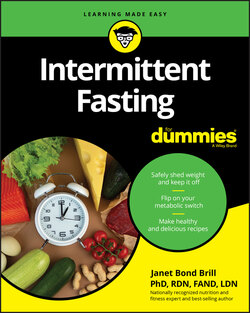Читать книгу Intermittent Fasting For Dummies - Janet Bond Brill - Страница 43
LOOKING TO PHYSICS TO EXPLAIN CALORIES
ОглавлениеIn an effort to clarify the calorie science, this calls for a refresher on Sir Isaac Newton’s laws of physics to help you understand calorie deficit. Newton’s first law of thermodynamics (in physics) is the law of conservation of energy. This states that energy can’t be created or destroyed in a closed system. Translation: If the calories in the foods you consume (even those foods you may consider to be clean) are more than the calories you burn (your resting metabolic rate and all your activity in a day), you’re creating a daily calorie surplus and you’re going to gain weight (fat). Simple. What about the other way around? If you eat fewer calories than you expend and create a daily calorie deficit, you’ll lose weight.
The following two terms are important when talking about calories and weight loss:
Calorie surplus: You eat more calories than you expend and create a daily calorie surplus, you gain weight.
Calorie deficit: You eat fewer calories than you expend and create a daily calorie deficit, you lose weight.
All diets — regardless of macronutrient (carbs, fat, and protein) percentage (low-carb, low-fat, Paleo, vegan, Mediterranean, or even intermittent fasting plans) — work through creating a calorie deficit. If you don’t create a calorie deficit, you don’t lose weight. If you create too great a calorie deficit, you lose muscle mass and your metabolic rate drops (yikes!).
It’s a balancing act, create the deficit, just not too much. Anyone who argues against the fundamental role of energy balance in weight regulation — against calories in versus calories out — is practicing an exercise in futility.
Even though it’s a fact that calories in versus calories out is the law, it’s equally true that the number of calories required to lose weight or maintain weight or gain weight differs from person to person. That’s because the calories required for each person vary widely and are influenced by numerous factors not under a person’s control such as genetics.
What’s also true is not all calories are created equally. There is a difference in the number of calories your body requires to burn and digest each of the three macronutrients: protein, carbs, and fat —scientifically termed the thermic effect of food. Protein has the highest thermic effect of the three macronutrients, but the increase in metabolic rate from eating protein (and therefore its contribution to weight loss) is negligible. The great thing about eating protein when intermittent fasting is that protein is the most filling of the macronutrients. Eating protein helps curb your appetite — a welcome addition to any weight-loss plan.
Forget the marketing hype and fad diet gimmicks. When it comes to losing weight, eat fewer calories and burn more calories, and over time you will lose weight.
